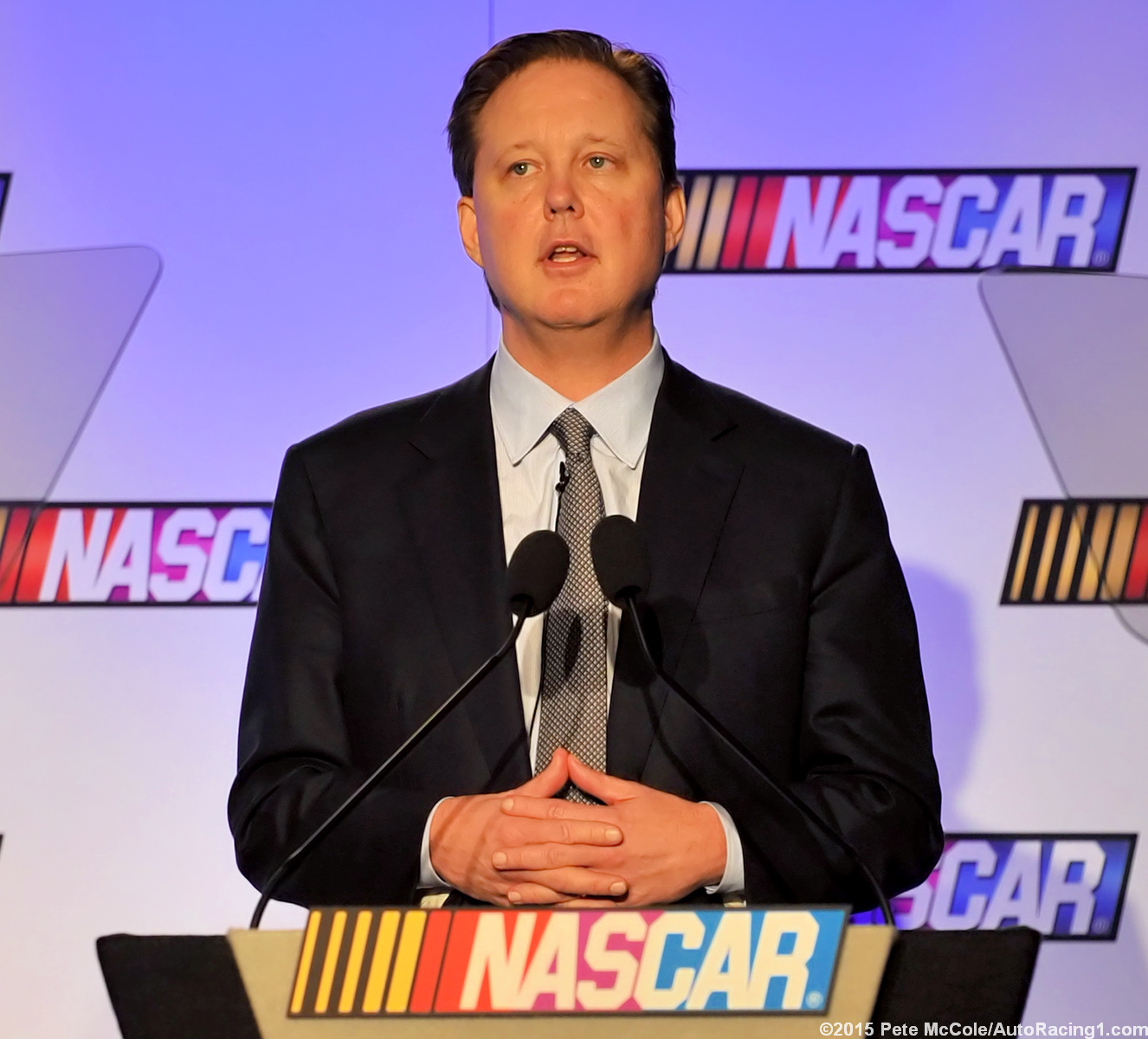Brian France blazes ahead in continuing bid to evolve NASCAR
 |
| Brian France |
Brian France was digesting a hurried lunch and morsels from a just-concluded media forum as a helicopter was prepped to whisk him from Homestead-Miami Speedway. At the other helipad was a business meeting with family members that could alter the sport his clan had overseen since 1948 writes Brant James of USA Today.
The 53-year-old series chairman and third-generation caretaker of a sanctioning body formalized by his late grandfather, "Big" Bill, and forged into a major league by his late father, Bill Jr., Brian Zachary France has, in 12 years in charge, overseen some of the most transformative, modernizing times in the history of a sport created by rapscallions and rascals hauling illegal liquor. For that, he is at once celebrated and chided, perspective pending, but from all angles scrutinized.
Fans seems to flitter between the notion that he is utterly ruining his family business that they happen to love, or maybe that he's just tarnishing it some. Drivers have complained about modifications to the way they compete for the sake of keeping the sport relevant in a landscape that seems generally less interested in motor sports. But they, like team owners must concede to his successes, such as procuring a monstrous $4.4 billion, 10-year television package from NBC Sports in an era when grandstands reflect sunlight in the absence of ticket-buyers and ratings have trended at times in recent years from morose to terrifying for the industry.
Whereas NASCAR under his predecessors was a fondly remembered benevolent dictatorship in simpler times, France's is one of layers and complexity. Delegation and direction. Less romance, more data. Tradition and relevance.
"It's the easiest thing to do and the hardest thing to do all at once because it's not hard to understand how you have to progress in certain areas to make racing better, closer more important in an already crowded landscape," France told USA TODAY Sports in a wide-ranging, 30-minute interview. "That's not overly complicated. What's complicated is, when you do it to their sport.
"If race fans don't like it, imagine team owners or drivers who are going to be affected by a format or a big change we're going to make in the rules. Big change, they're going to have huge reactions until it smooths out. And so managing all that, and taking that incoming shrapnel that you're going to have, if you're a guy like me, is hard, because you know it's coming. But you also know you have to cross to the other side and you have to do these things to make our sport as popular and deliver on the promise on close safe racing as you possibly can. That's the balance."
Leaning forward in his chair in a boardroom overlooking vast parking lots and tree farms, France seems stimulated by the prospect of finding that balance. He has more ideas. Some will be popular. Some will not.
"It's understandable because we are making structural changes in the sport," he added, "and I get that that is unsettling even for people who think I can do no wrong, those 10 people out there that think that."
In a lengthy media session two days before the Chase for the Sprint Cup finale, in which he fielded numerous questions about the state of the sport, the line between entertainment and competition in the wake of Matt Kenseth's two race-suspension for intentionally wrecking Joey Logano – in essence, out of championship contention in an act of retaliation at Martinsville Speedway – a chairman often criticized for a perceived disconnection with the daily pulse of the sport seemed very much engaged. Invigorated, even, in how he doubled down on several key themes in his defense of the new Chase system that has stoked competition and aggression the past two seasons. Feisty, even, in how he reiterated his use of the word "quintessential" in describing Logano's move to dislodge Kenseth from the lead late at Kansas Speedway – which flipped the first domino in the feud with the veteran – even after the word had been hash-tagged and brandished in derision by those either sympathetic to Kenseth or decrying a broader problem with series leadership.
No, France seemed very engaged, indeed. And with more initiatives afoot – including what would be a major shift in the series business model with a possible new chartering system for ownership – he doesn't seem like he is or wants to go anywhere.
"I think I'm having more fun than I've had in a long time, even though it's hard and so on," France said. "But we're making a lot of progress on things and I'm able to get a lot of things through a complicated business industry. And that's rewarding." Brant James/USA Today
